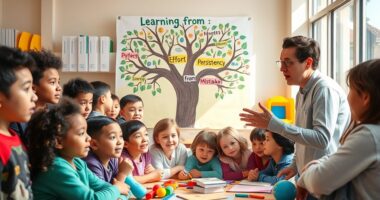Children learn to see other perspectives as they grow through social interactions and experiences. They start by recognizing facial expressions, tone, and body language, gradually understanding that others have different thoughts and feelings. Activities like pretend play, storytelling, and exploring characters’ emotions help build their empathy and social understanding. As kids encounter diverse situations, they become better at anticipating reactions and recognizing beliefs that differ from their own. Keep exploring, and you’ll discover how this fascinating process continues to develop over time.
Key Takeaways
- Children develop theory of mind gradually through social interactions, recognizing others have different thoughts, beliefs, and feelings.
- Empathy skills, starting in early childhood, help kids understand and share others’ emotional experiences.
- Engaging in pretend play, storytelling, and reading about characters’ perspectives fosters perspective-taking abilities.
- Increased social experiences and recognizing that beliefs can differ enhance understanding of others’ mental states.
- Recognizing cultural differences and anticipating reactions improve children’s ability to see and respect diverse viewpoints.

Have you ever wondered how we comprehend that others have thoughts, beliefs, and feelings different from our own? This ability, known as Theory of Mind, is essential for social interactions and relationships. When kids develop Theory of Mind, they begin to understand that people have their own perspectives, desires, and emotions. This understanding doesn’t happen overnight; it’s a gradual process influenced by empathy development and social understanding. As children grow, they start to recognize that someone else’s feelings might differ from their own, allowing them to navigate social situations more effectively.
In the early years, children’s social understanding is quite limited. They often see the world solely from their own point of view. But as they interact with family, friends, and peers, they start to pick up on subtle cues—facial expressions, tone of voice, and body language—that hint at others’ inner states. These interactions foster empathy development, which is the foundation for understanding that other people experience things differently. When children empathize, they put themselves in someone else’s shoes, trying to imagine what they might be feeling or thinking. This emotional skill is indispensable because it helps them connect with others and respond appropriately to their needs.
As children gain more social experiences, their social understanding deepens. They begin to grasp that beliefs and knowledge can be different from their own, even if they are based on incomplete or incorrect information. For example, a child might realize that a friend’s misstatement about a shared event is due to mistaken beliefs, not intentional deception. This insight reflects a more sophisticated level of Theory of Mind. It also enables children to anticipate how others might react in various situations, which is fundamental for cooperation and conflict resolution. Additionally, understanding cultural differences can further enhance their social awareness and adaptability in diverse environments.
You might notice that young children often struggle with perspective-taking, but with time and practice, their ability improves. Engaging in pretend play, reading stories, and discussing characters’ feelings all support this growth. These activities encourage children to consider viewpoints outside their own, strengthening their social understanding. As they develop, they become more adept at recognizing that people’s thoughts and feelings are complex, and that understanding these differences helps them build stronger, more empathetic relationships.
Ultimately, the development of Theory of Mind is a cornerstone of social competence. It shapes how kids interpret others’ actions and respond with kindness and empathy. By understanding that everyone has unique thoughts and feelings, children learn to navigate their social world with greater insight and compassion.
Frequently Asked Questions
When Do Children Typically Develop a Theory of Mind?
You’ll notice children typically develop a theory of mind around age four. At this stage, they start understanding false beliefs, realizing others can hold incorrect ideas. This milestone also boosts empathy development, as they grasp that people have different thoughts and feelings. By recognizing these perspectives, kids become better at social interactions, showing more compassion and understanding as they grow.
How Can Parents Support the Development of Theory of Mind?
You can support your child’s development of theory of mind by encouraging empathy development and enhancing their language skills. Talk about feelings, both theirs and others’, to foster empathy. Use open-ended questions to stimulate perspective-taking and listen actively. Reading stories together helps children understand different viewpoints. By engaging in these activities, you help your child better grasp others’ emotions and thoughts, strengthening their ability to see the world from different perspectives.
Are There Cultural Differences in How Children Develop This Skill?
Yes, cultural differences influence how children develop theory of mind. In some cultures, strict adherence to cultural norms and language diversity shape social interactions, affecting perspective-taking. You might notice that children in more collectivist societies are encouraged to contemplate others’ feelings more early on, while those in individualist cultures focus on personal viewpoints. These cultural variations help shape how kids learn to see and understand other perspectives over time.
What Are Signs a Child Might Be Struggling With Understanding Others?
If your child’s empathy challenges make them seem like a robot trying to understand human feelings, they might struggle with perspective-taking difficulties. Signs include ignoring others’ emotions, having trouble sharing or taking turns, and missing social cues. They may appear detached or unaware when someone is upset or happy. Recognizing these signs early helps you support their social development, turning their robotic reactions into genuine connections.
How Does Theory of Mind Influence Social Interactions in Children?
You notice that when children develop theory of mind, their social interactions improve because empathy development and perspective-taking skills become stronger. They understand others’ feelings, share more effectively, and respond appropriately to social cues. This ability helps them navigate friendships and resolve conflicts more easily. As they grow, their improved understanding of different perspectives fosters better communication, cooperation, and emotional connections, making social interactions more positive and meaningful.
Conclusion
Just like opening a window to someone else’s world, developing a theory of mind lets you understand others better. As kids learn to see things from different perspectives, they build empathy and connection. It’s a skill that grows gradually, like a plant reaching toward the sun. So, keep nurturing curiosity and patience. With every new insight, you’re helping children see the world through others’ eyes—making their social world richer and more understanding.









